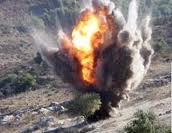
May 17 2009, 26 Years on Foiling Humiliating Agreement with "Israel"

Mohamad Shmaysani
Source: almanar.com.lb, 17-5-2009
In 1983, Lebanon was recovering from a fierce "Israeli" war launched under the pretext of crushing the Palestinian resistance. That same year, Lebanon nearly became the second Arab state to sign a peace deal with the "Israeli" entity, or did it?
On the 17th of may 2003, then Lebanese President Amin Gemayel, now a key figure in the March 14 bloc, represented by Antoine Fattal, signed the deal with the "Israeli"s; a deal that was thwarted one year later...under the pressure of a popular uprising.
The events:
At that time "Israel" needed the deal to achieve its other goals.
The United Stated represented by its envoy Philippe Habib granted "Israel" its wish. Negotiations kicked off on the 28th of December 1982. 35 rounds of talks were held alternately between the Lebanon Beach Hotel in the "Israeli" occupied Khalde region and a ballet hall near the settlement of Kiryat Shmona.
From the first round of talks, the "Israelis" never left any detail for coincidence; they even imposed the shape and dimensions of the negotiations table.
The term "normalization" was not mentioned in the text of the agreement which stated on forming a joint contact committee to hold regular meetings in Lebanon and "Israel". The committee was given the mission of developing bilateral relations, including controlling the movement of imports and exports, individuals, etc.
The Lebanese delegation sought to renounce terms which made the agreement look like a peace agreement, fearing Lebanon would be boycotted by Arab states as was the case with Egypt. So the deal was named "The "Israeli" withdrawal agreement." Yet it implicitly ended the state of war which was declared against "Israel" since the establishment of the Zionist entity.
The agreement gave "Israel" the right to establish a security zone in south Lebanon controlled by 4341 soldiers from both Lebanese and "Israeli" armies. Local forces, according to the text, would protect the zone, in an indication to the collaborating forces of Saad Haddad. The deal determined the makeup of the Lebanese army forces to be allowed to be present in this area, limiting their number to two brigades in addition to police and internal security forces.
However the deal never saw light.
A campaign of protests was launched just after parliament endorsed the bill of the agreement. In 1984 the struggle broke out and the "February 6 Uprising" forced Gemayel to take back the agreement to parliament, to be annulled on the 5th of March 1984.
At that time, the resistance was carrying out operations against "Israeli" occupation forces and their collaborator until it forced them to withdraw from Lebanon on the 25th of may, 16 years later.
"In respect of our memory and to the commemoration of the May 17 (agreement), it is regrettable to see those who stood up to the May 17 agreement that was signed by the then Lebanese regime that yielded to "Israeli" conditions out of weakness, defeat and disgrace take a different position today. Who signed the agreement? Who wanted to succumb Lebanon to "Israel" through that agreement? Who stood up to the agreement, from scholars, men and women, particularly in the Imam Rida mosque in Bir el-Abed (Beirut's southern suburb)? Who spilled his blood to declare Lebanon's rejection to the agreement, other than martyr Mohammad Najdeh? Who signed the agreement of disgrace with "Israel"?
Today, those who had sought to give in Lebanon to "Israel" have become symbols of sovereignty, freedom and independence while those who offered their blood to liberate Lebanon have become symbols for subordination to the outside powers. Isn't this unfair? Can we forget this?" Hizbullah Secretary General Sayyed Hassan Nasrallah said on Friday, May 15, 2009.


